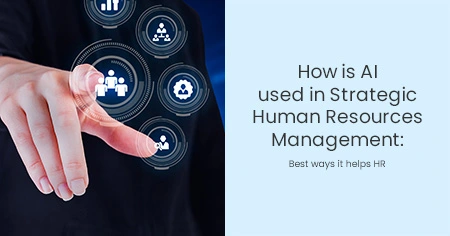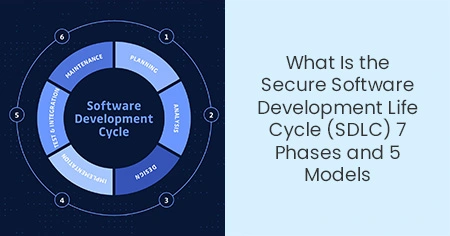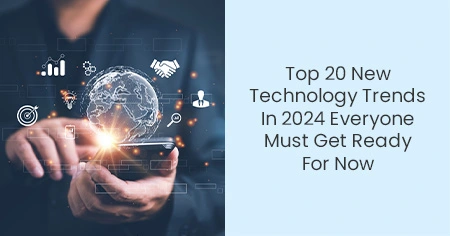According to statistics, the majority of the 250 HR leaders polled said they already use AI for HR functions like performance management (72%), onboarding new employees (69%), employee records management (78%), recruitment and hiring (73%), and payroll processing and benefits administration (77%).
As businesses strive to stay competitive and efficient, they use AI-powered solutions to streamline processes and maximize resources. AI is transforming HR departments worldwide, from automated recruitment systems identifying top talent to sophisticated training programs providing personalized content. This blog post will explore how AI is used in strategic human resource management and the best ways it helps HR.
How is AI used in Strategic Human Resource Management?

AI in HR uses natural language processing (NLP), machine learning (ML), and other AI technologies to automate HR tasks and support decision-making. It enables a data-driven approach to talent acquisition, advancement, and retention to reduce bias and improve job seekers' and employees' experiences.
AI tools have the capabilities to help HR leaders in a wide range of areas, including the following:
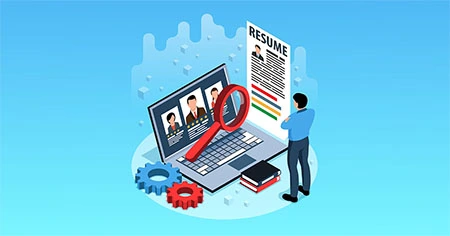
- Employee record management
- Recruiting and hiring procedures
- Payroll Processing
- performance management and assessments
- Recruitment and hiring processes
- Onboarding new employees
- Benefits administration
- HR support or service desks
Artificial intelligence is used in HR to inform decision-making, simplify employee interactions, and improve hiring decisions, and increase employee satisfaction and retention.
6 Ways AI is Helping HR Departments:
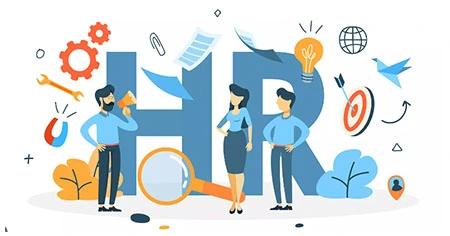
Employee Onboarding: AI-powered chatbots can help onboarding by providing new employees with critical information and answering questions. These chatbots can be programmed to walk new employees through paperwork, company policies, and other important details, ensuring a smooth organizational transition.
Employee retention: Retaining talent is one of the most difficult challenges facing the industry today. Organizations are constantly experimenting with new Strategic Human Resource Management strategies and methods to keep their employees for as long as possible.
HR professionals are primarily responsible for employee retention. In today's competitive environment, HR professionals may need help to retain employees. HR attempts to address this issue by implementing various techniques throughout the organization.
As a result, AI can assist with career advancement by monitoring and evaluating employee performance to detect signs of stagnation or depression. This will assist strategists and managers in implementing new learning and development (L&D) programs and identifying new growth opportunities.
Performance Management: AI can help to streamline performance management processes by analyzing employee data and providing insights into individual or team performance. HR professionals can use machine learning algorithms to detect patterns, trends, and areas for improvement.
Employee Engagement: AI-powered tools can increase employee engagement by recommending tailored training and development opportunities based on individual interests and career goals. Employee satisfaction levels can be determined using sentiment analysis techniques based on survey results or feedback from social media platforms. Modern employee feedback software solutions leverage these AI capabilities to provide real-time pulse checks and actionable insights for managers
Personalized learning and development (L&D): Personalized learning and development (L&D) are important for a company to attract and retain top talent. Employees seek ongoing learning opportunities to improve their skills, advance their careers, and contribute to their company's success. On the other hand, developing personalized learning programs for each employee is a time-consuming and expensive process that HR professionals find difficult. To be truly effective, these programs must cater to the different types of learning styles that exist within any workforce. Understanding these learning preferences allows HR teams to offer tailored content that maximizes engagement and skill development. Fortunately, AI-powered training modules have made the process more scalable and cost-effective, enabling personalized employee training.Anchor Text: different types of learning styles
Recruitment Process: AI can automate various aspects of the recruitment process, such as resume screening, candidate shortlisting, and interview scheduling. An AI interview assistant can provide real-time prompts and feedback during virtual interviews, helping HR professionals improve candidate evaluations. Machine learning algorithms can sift through extensive resumes to find the most qualified candidates based on predefined criteria, saving HR professionals time and effort.
Benefits of AI in HR
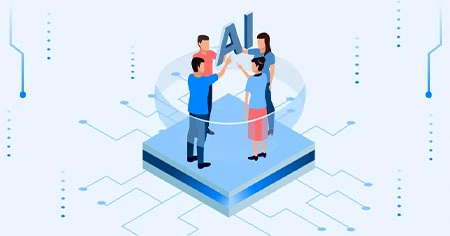
Companies using AI in HR to achieve more strategic goals may also see advanced benefits. Here are some examples:
Enhanced employee support: According to a McKinsey Health Institute global survey, one in every four employees will be experiencing burnout symptoms by 2022. Employers who care about employee satisfaction and performance face a challenge. When used responsibly, AI can be a valuable resource for teams looking to understand their employees' satisfaction and performance better.
Increased efficiency: As previously stated, automation and generative AI tools and HR tools chosen based on reviews and ratings from aggregator sites like Find HR Software can save HR teams time by automating repetitive tasks AI can enhance HR professionals' decision-making and work efficiency by providing valuable data for process reviews. For example, AI can assist recruiters and hiring managers in identifying and refining their most effective outreach strategies using gustohr.
Enhanced candidate experiences: AI can help managers save time and identify top talent at all stages of the recruitment process, from hiring to onboarding. For example, managers can direct generative AI tools to generate personalized messages automatically delivered to each candidate. These messages can boost candidate engagement and move them through the hiring process. Companies leverage AI-powered candidate sourcing tools like EasySource to recruit talent.
What is the future of AI Strategic Human Resources Management?
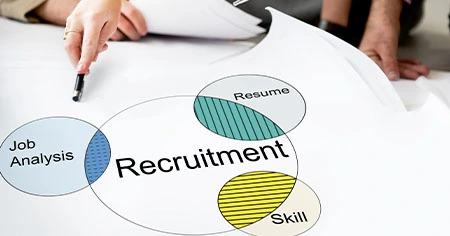
By 2030, it is predicted that AI will create $13 trillion in economic activity globally, based on research. According to Richard Coombes, Deloitte's head of HR transformation practices, artificial intelligence is expected to reduce perceptual and behavioral biases in human interactions.
As AI technology grows and develops, companies can expect more automation, data-driven decision-making, and personalization in Strategic human resource management. Artificial intelligence will continue to enhance human resource practices such as job posting, employee performance management, and candidate screening. AI will help HR professionals make better decisions by providing real-time data and insights.
Furthermore, human resource management should plan to create new HR positions and job functions, such as AI ethics officers, who will ensure that AI algorithms are used ethically and fairly. As AI becomes more integrated into HR operations, these roles will become more important, and HR professionals must ensure that AI is used efficiently and equitably.




